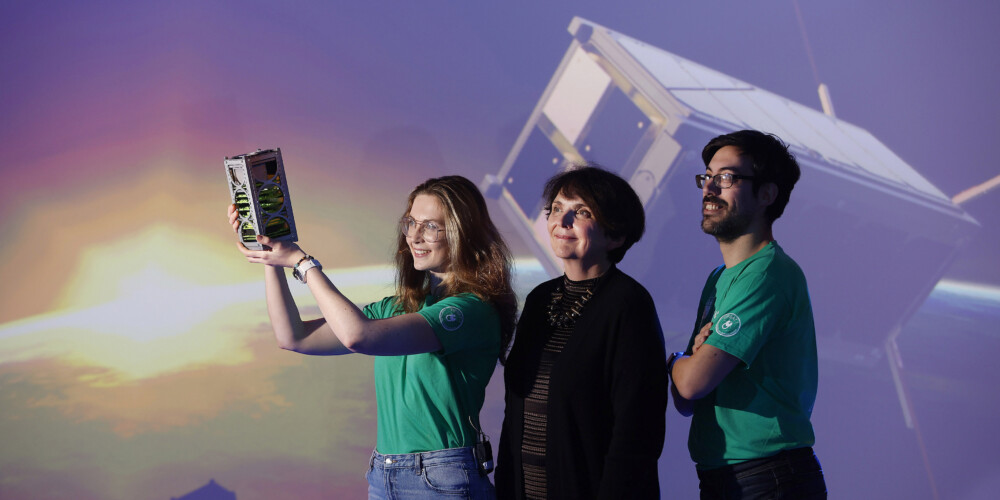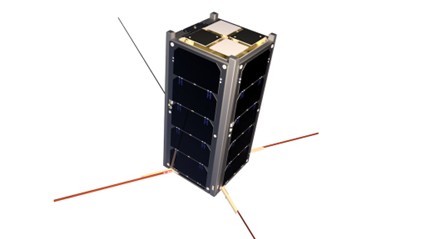
Find information on how to make a Protected Disclosure under the external procedures in place in the HEA.

Ireland’s first satellite: EIRSAT-1 transforming the national space landscape
The EIRSAT-1 is an award-winning project that brought together university students, researchers, and industry partners to design, build, launch and operate Ireland’s first satellite.
The project was led by University College Dublin (UCD), and we received significant contribution from industry partners who provided their expertise and resources. The engagement and guidance of the European Space Agency (ESA) was a key element to the success of our project and through their Fly Your Satellite programme, students and staff had the opportunity to connect with experienced professionals in the space industry. We also partnered with the research teams from organisations such as the ESA and NASA to ensure that the project was based on best practices and incorporated the latest innovations in the field.
Ireland has been expanding its focus on research and innovation, particularly in strategic areas of science and technology. However, students have had limited opportunities to acquire hands-on experience in space-related projects. To bridge this gap, we developed this project to support student development in specialised skills, as well as to advance Ireland’s involvement in space research.
We built EIRSAT-1 on the foundation of earlier educational and research initiatives at UCD and drew on learnings from similar international student-led satellite missions to refine our project design and execution.
Phase 1 (2017-2018) – Design Your Satellite!
Partnering with European Space Agency’s (ESA) Fly Your Satellite! programme provided UCD students and professors with the opportunity to develop their skills in space engineering, project management, and teamwork through invaluable educational experience. We fostered connections between UCD, ESA, and other university teams to build a strong network of future professionals in the space sector.
Phase 2 (2019-2020) – Build Your Satellite! Production & Functional Tests
We designed and manufactured critical satellite components, providing students with direct experience in high-precision aerospace engineering. We also established advanced test facilities, enabling rigorous testing procedures for space missions. During this phase, we meticulously inspected and evaluated commercial subsystems – such as solar panels, batteries, and on-board computers – offering students valuable opportunity to learn about quality assurance and risk management.
Phase 3 (2021-2022) – Test Your Satellite! Environmental Tests
We performed environmental tests – such as vibration and thermal cycling – to simulate launch and in-orbit conditions and validate the satellite’s resilience and functionality in space. Over 20,000 hours were spent on testing and troubleshooting, during which students developed strong problem-solving skills, and learned to innovate under real-time pressure and unforeseen challenges.
Phase 4 (2023) – Launch Your Satellite! Launch Campaign & Launch
We launched EIRSAT-1, Ireland’s first space mission, marking a historic achievement that positioned UCD and Ireland in the global space community.
We also orchestrated a national outreach campaign merging poetry, space science, and cultural events to raise public awareness and inspire cultural change around STEM (Science, Technology, Engineering, and Mathematics) and space exploration. Central to this campaign was the Space Poem Initiative, in which we successfully engaged writers, students, teachers, librarians, engineers, scientists, and artists. Together they created the ‘All Ways Home’ poem connecting Ireland’s literary heritage with its growing space endeavours. We laser-etched the poem onto the outer cover of EIRSAT-1 to symbolically carry Ireland’s literary voice into space.
Our campaign extended beyond the poem itself to include extensive media coverage, live events, and digital content, including an animation of the poem, bringing it to life and making it accessible to a broader audience. The Irish broadcaster RTÉ covered the satellite’s journey, highlighting the project’s unique blend of art and science.
Phase 5 (2023-2026) – Operate Your Satellite! Operations & Ongoing Monitoring
We established a Mission Control Centre at UCD and collaborated with ESA’s European Space Operations Centre (ESOC) to train students as spacecraft operators. They conducted real-time monitoring, diagnostics, and orbit management of EIRSAT-1, gaining professional experience in mission operations.
Throughout the project, students were monitored and supported, with regular feedback from academic mentors, the ESA, and industry experts on technical and project management aspects to ensure they were gaining the necessary skills.

Figure 1: EIRSAT-1 Satellite
Educational impact
Our project led to significant educational impact on students at all levels. We reached over 10,000 people through school visits, festivals, competitions, careers events, workshops, exhibitions, and conferences.
The ‘EIRSAT-1: Ireland’s First Steps into Space’ comic book, created as part of our campaign, reached 25,000 students. The comic book not only increased mission awareness but also supported STEM engagement, especially during the COVID-19 pandemic, when 85% of teachers involved found it supported their teaching.
As part of the project’s outreach, UCD, Museum of Literature Ireland (MoLI), and the JCSP Demonstration Library Project brought DEIS school pupils from all around the country to collaborate with UCD MA Creative Writing students in creating the ‘All Ways Home’ poem through a series of workshops.
The Department of Education & Skills’ Oide group developed 13 curriculum resources inspired by EIRSAT-1, including topics such as coding and radio communications. These resources reached 70 teachers via workshops and webinars.
We are also developing a new Spacecraft Operations module for UCD’s MSc in Space Science & Technology, to ensure future students benefit from the project’s knowledge.
Economic impact and employment opportunities for graduates
About 50 students from UCD’s disciplines Physics, Mechanical, and Materials Engineering, were involved in this project. Over six years, they had the opportunity to build their experience in space research and technology, with many transitioning into industry careers with project partners.
Our project has not only advanced space science and engineering education at UCD but also helped establish Ireland as a credible player in the global space sector. EIRSAT-1 carries fully-qualified, Irish-developed payloads, including the Gamma-ray Module, Antenna Deployment Module, and control systems, providing tangible evidence of Ireland’s emerging expertise in spacecraft systems engineering and satellite communications – capabilities previously non-existent within the state.
Building industry-academic partnerships and incorporating Irish technology into the spacecraft has led to an economic impact with the award of €7.6M to the ‘National Space Subsystems & Payloads Initiative’ (NSSPI) through the Disruptive Technologies Innovation Fund (DTIF), representing the largest single ‘space’ investment in Ireland. NSSPI is led by UCD, with 6 partner companies, two of whom have recruited EIRSAT-1 graduates.
Policy and cultural impact in Ireland
The mission has had a significant policy impact. This included Ireland’s ratification, via Dáil debate, of the UN Outer Space Treaty, a prerequisite for the launch of the country’s first satellite. The launch itself marked a historic achievement for Ireland. The live broadcast attracted over 64,000 viewers, and a documentary about the mission was viewed 28,000 times on YouTube.
The broader EIRSAT-1 launch campaign connected space science with poetry, art, and music, and engaged diverse groups via educational outreach, public media, digital content, and live events, reaching a combined audiences of 13 million and significantly raising public awareness and inspiring cultural change around STEM and space exploration.